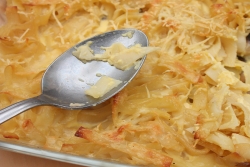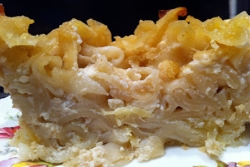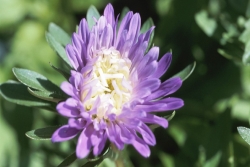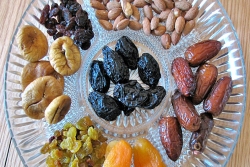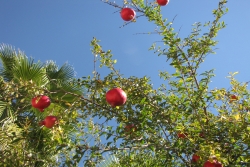Lokshen Kugel [Noodle Pudding]
Lokshen Kugel means "noodle pudding" in Yiddish. It originated in eastern Europe where the Jewish community spoke that language. This item falls into the category of "grandma's dishes."
Vegan Lokshen Kugel (Noodle Pudding) Just Like Mom's
My mother's lokshen kugel is probably the best thing she made for us every year on Rosh HaShanah and Yom Kippur. It took some trial and error to successfully make it vegan, but here it is! This recipe makes a big, casserole-dish-sized kugel.
Vegan Blueberry Blintzes
A vegan or plant-based diet is one that is free from all animal products. Vegan foods are pareve by nature - without dairy or meat.
Bread Kugel with Dried Fruit and Sun-Dried Tomatoes
Combines many of the flavors and foods found in Spain and Portugal with the classic technique for making a bread kugel.
Chocolate Chip Mystery Mandelbrot
Mandelbrot means “almond bread” in Yiddish, but its origins are the biscotti cookies that were created in Italy more than 700 years ago. This recipe is featured in Tina Wasserman's book, Entree to Judaism for Families filled with tools to help children learn to cook with confidence, with clear, step-by-step instructions for every recipe and tips for adults to make the experience safe and rewarding.
At Tu BiShvat, Digging for Spiritual Growth
While my neighbors were putting their Christmas trees to the curb, in what seems like a ritual of replacement, I was preparing to plant for Tu BiShvat.
Those Who Plant Will Reap: A Tu BiShvat Lesson
Tu BiShvat is a reminder that we spend our lives planting seeds. Time and effort are needed for our efforts to bear fruit. Wait patiently. One day, like the seed, we will be blessed.
Planting a Seed
By Joshua Weinberg
“And when you come into the Land, and have planted all manner of food bearing trees… (Lev. 19:23) The Holy one Blessed be he said to the people Israel: Even though you have found [the land] full of plenty, you shall not say: We shall sit and not plant, rather proceed with caution in your planting… For as you have entered and found the fruits of others’ labor, you so shall plant for your children. (Midrash Tanhuma)
If you’re like me, then you may remember that pivotal moment of Jewish education when you received your very own Jewish National Fund (JNF) certificate for a tree planted in Israel. Whether it was for a birth, birthday, bar/bat mitzvah, or in memory of a loved one, a tree was planted in Israel to mark the occasion. The message was clear: with every passing milestone we want to connect Jews to the Land of Israel and to the Zionist enterprise. All of us who were the fortunate recipients of such trees knew in the recesses of our mind that somewhere in that strip of land, in some forest, was our tree, our little piece of Israel. As the certificates read, the JNF wished us the following: “We wish you the fortune of seeing it grow with much pleasure and ease.”
I am familiar with a Passover seder, but what is a Tu BiShvat seder?
Tu BiShvat (Hebrew for the 15th day of the Hebrew month of Shvat) is the new year of the trees.
Tu BiSh'vat: A Time to Celebrate Environmental Justice
There are many reasons to celebrate Tu BiSh’vat this year, as this has been an exciting year for environmental justice.
